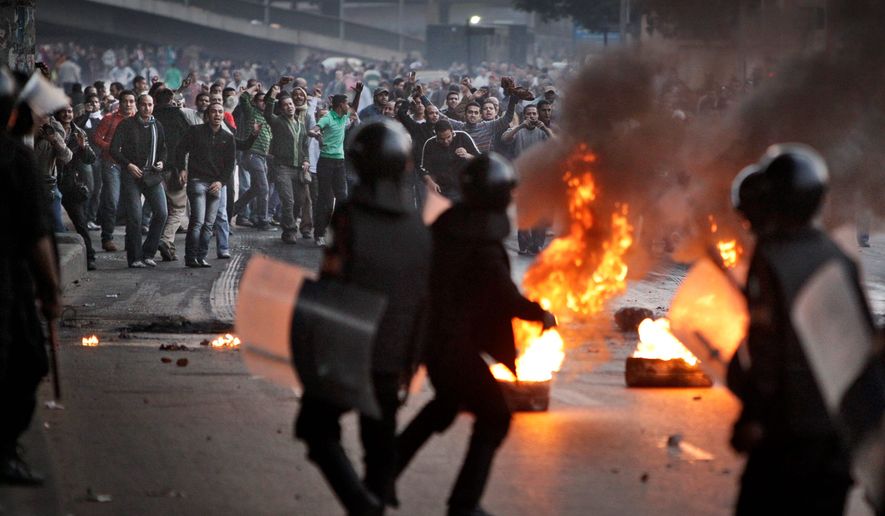The Obama administration on Wednesday voiced its support for the Egyptian people’s rights to freedom of expression and assembly, as a second day of protests in Cairo saw police using tear gas and rubber bullets to disperse stone-throwing demonstrators.
Speaking to reporters on Wednesday, White House press secretary Robert Gibbs declined to say whether the U.S. still supports Egyptian President Hosni Mubarak, reiterating only that Egypt remains a “strong ally.”
“We have an unyielding belief that all people yearn for certain things: the ability to speak your mind and have a say in how you are governed; confidence in the rule of law and the equal administration of justice; government that is transparent and free of corruption; and the freedom to live as you choose. These are human rights, and we support them everywhere,” Mr. Gibbs said.
Meanwhile, angry Egyptians seeking Mr. Mubarak’s ouster defied a ban on protests, lobbing firebombs and stones, as police responded with tear gas and rubber bullets to break up the demonstrations. The government in Cairo vowed to arrest and prosecute anyone involved in the protests.
Security officials said a total of 860 protesters have been rounded up nationwide since Tuesday, according to the Associated Press. Incidents of violence were reported from Cairo and the port city of Suez, and four people have been killed in the protests.
Protesters are planning another massive demonstration after prayers on Friday. Their anger has been stoked by rampant poverty, rising prices and growing unemployment.
The Obama administration is closely monitoring developments in Egypt.
This is an “important time for the government to demonstrate its responsiveness to the people of Egypt in recognizing those universal rights,” Mr. Gibbs said, adding that the U.S. expects Egyptian authorities to respond peacefully.
Steven A. Cook, a senior fellow for Middle Eastern studies at the Council on Foreign Relations, witnessed firsthand the protests in Cairo’s Tahrir Square and said he was “scared to death” by the Central Security Forces’ (CSF) crackdown on demonstrators.
In a phone interview with The Washington Times from Cairo on Wednesday night, Mr. Cook said the Egyptian capital was crawling with CSF and police officers. He said most people he had spoken with were sympathetic of the protesters, but terrified of the police.
The protesters have been inspired by recent developments in Tunisia, where former President Zine El Abidine Ben Ali was forced to flee the country on Jan. 14 in the wake of a popular uprising.
“By no means was Tuesday’s protest [in Egypt] a one-off event. Tunisia has opened possibilities and people now understand that it is possible to dislodge a dictator,” Mr. Cook said.
Marina Ottaway, director of the Middle East program at the Carnegie Endowment for International Peace in Washington, said the government’s handling of the protests has created some tension between the U.S. and Egypt.
“The Obama administration is rushing to establish some credibility concerning its support of democracy,” Ms. Ottaway said, noting that the U.S. reaction to a questionable Egyptian election on November had been muted.
“But keep in mind that we do not see clearly how far the administration is willing to go,” Ms. Ottaway said.
• Ashish Kumar Sen can be reached at asen@washingtontimes.com.




Please read our comment policy before commenting.